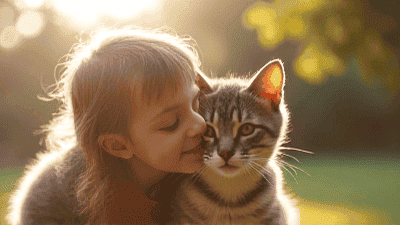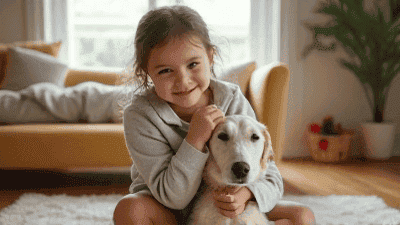
Pets have long been cherished members of the family, offering companionship, love, and joy to households of all shapes and sizes. For families with children, pets can play an especially important role in fostering emotional, social, and physical development. The benefits of growing up with pets are vast and far-reaching, touching on everything from mental health to life skills.
The bond between children and pets is a unique and powerful one. Pets offer unconditional love, teach responsibility, and provide a sense of security and companionship. For children, growing up with pets can be a transformative experience that shapes their character and worldview. Here are some of the key reasons why pets are a valuable addition to any family:

One of the most profound benefits of growing up with pets is the emotional impact they have on children. Pets offer unconditional love and companionship, helping children navigate their feelings and develop important emotional skills.
Pets rely on their owners for care and attention, which provides children with an opportunity to practice empathy and compassion. By tending to their pet’s needs, children learn to consider the feelings and well-being of another living being. This understanding of empathy extends beyond their relationship with their pet, helping them develop stronger interpersonal skills with family and friends.
Pets can be a source of comfort and security for children, especially during times of stress or uncertainty. The presence of a pet can help children feel safe and supported, reducing anxiety and promoting emotional resilience. For example, many children find solace in cuddling with their pet after a tough day at school or during periods of change, such as moving to a new home.
Pets are nonjudgmental listeners who provide a safe space for children to express their emotions. Whether a child is happy, sad, angry, or confused, their pet is always there to offer silent support. This emotional outlet can be particularly beneficial for children who struggle to articulate their feelings to others.
Pets can also play a significant role in helping children develop social skills and build connections with others. From improving communication to fostering a sense of belonging, the social benefits of pets are undeniable.
Caring for a pet requires effective communication, whether it’s giving commands, reading body language, or understanding vocal cues. These interactions help children improve their verbal and nonverbal communication skills, which can translate to better relationships with peers and adults.
Pets offer unconditional love and acceptance, which can boost a child’s self-esteem and confidence. Successfully caring for a pet, such as teaching them a new trick or ensuring they’re well-fed and groomed, gives children a sense of accomplishment and pride. This positive reinforcement helps children feel capable and valued.
Pets can be a great conversation starter and help children connect with others who share their love for animals. Whether it’s talking to classmates about their dog or joining a local pet club, pets provide opportunities for social interaction and friendship.

Pets encourage physical activity and promote a healthy lifestyle, benefiting children in numerous ways.
Dogs, in particular, require regular exercise, which encourages children to spend time outdoors. Activities like walking, running, and playing fetch provide both physical exercise and fresh air, helping children stay active and healthy.
In today’s digital age, children often spend hours in front of screens. Pets provide a fun and engaging alternative, encouraging children to put down their devices and interact with their furry friends instead. This reduction in screen time can lead to improved physical health and better sleep patterns.
Research suggests that children who grow up with pets, especially dogs and cats, may have stronger immune systems. Exposure to pet dander and outdoor germs can help build immunity and reduce the risk of allergies and asthma in some children.
Pets have a remarkable ability to improve mental health and well-being, offering comfort, reducing stress, and providing a sense of purpose.
The presence of a pet can have a calming effect on children, helping to reduce stress and anxiety. The simple act of petting a dog or cat can lower cortisol levels, a hormone associated with stress, and release oxytocin, a hormone that promotes feelings of happiness and relaxation.
Pets provide constant companionship, which can be especially valuable for children who feel lonely or isolated. Whether it’s an only child or a child struggling to make friends, having a pet by their side can offer a sense of belonging and reduce feelings of loneliness.
Caring for a pet can teach children valuable coping skills, such as problem-solving and resilience. For example, if a pet becomes ill or requires special care, children learn to adapt and manage challenges in a positive and proactive way.

Taking care of a pet requires responsibility, accountability, and a commitment to meeting their needs. These experiences teach children important life skills that will serve them well into adulthood.
Caring for a pet involves daily tasks such as feeding, grooming, and cleaning up after them. These responsibilities teach children the importance of consistency and accountability, helping them develop a strong work ethic and sense of duty.
Balancing school, extracurricular activities, and pet care requires effective time management. Children learn to prioritize tasks and manage their schedules, which are valuable skills for academic and professional success.
Pets can present challenges, such as behavioral issues or health concerns, that require creative problem-solving. Children learn to think critically and find solutions, developing their ability to handle complex situations.
To maximize the benefits of growing up with pets, it’s essential to choose the right pet for your family’s lifestyle and needs. Here are some factors to consider when selecting a pet:
Once you’ve chosen the right pet, it’s important to integrate them into your family life in a way that benefits both children and pets. Here are some tips for creating a harmonious household:
The benefits of growing up with pets are undeniable, offering emotional, social, physical, and mental health advantages that can positively impact children’s lives. From fostering empathy and compassion to encouraging active play and building life skills, pets play a vital role in the development of well-rounded individuals. For families considering adding a pet to their household, the rewards far outweigh the challenges. By choosing the right pet and integrating them into family life thoughtfully, you can create a loving and enriching environment where both children and pets thrive. So, open your heart and home to a furry friend, and watch as your family’s bond grows stronger than ever.